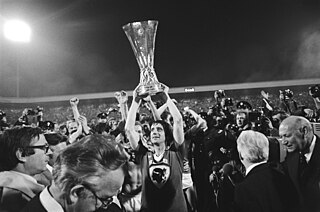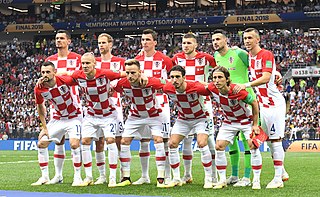The Croatian Football Super Cup is a football match between the winners of the Croatian national top league and football cup. The Super Cup is always held at the beginning of a new football season, and is only held when different clubs win the two most important competitions in the previous season.

The 1977–78 UEFA Cup was won by PSV Eindhoven on aggregate over Bastia.
The 1976–77 UEFA Cup was the sixth season of the UEFA Cup, a club football competition organised by UEFA. It was won by Italian club Juventus, who beat Athletic Bilbao of Spain in the two-legged final; both sides won one leg of the tie, which finished 2–2 on aggregate, but Juventus' solitary goal in the second leg at San Mamés Stadium in Bilbao saw them win on away goals. It was the first time that a team from Southern Europe had won the competition.
The 1960–61 Balkans Cup was the first edition of the Balkans Cup, a football competition for representative clubs from the Balkan states.

Ethnikos Piraeus F.C. is a Greek football club based in Piraeus and its parent sports club is Ethnikos OFPF. The club was officially formed on 21 November 1923 as Keravnos, but existed since 1922. One year later the club was renamed to Young Boys Titan, after some players' secession that formed Peiraikos Podosfairikos Omilos. The club was renamed to Ethnikos on 23 December 1924, after it merged with Peiraikos Podosfairikos Omilos.

The 1961–63 Balkans Cup was the second Balkans Cup, a football competition for representative clubs from the Balkan states. It was contested by 8 teams and Olympiacos won the trophy.
The 1966–67 Balkans Cup was an edition of the Balkans Cup, a football competition for representative clubs from the Balkan states. It was contested by 8 teams and Fenerbahçe won the trophy.
The 1929–31 Balkan Cup was the competition's first edition. Four teams participated: Romania, Greece, Yugoslavia, and Bulgaria. Romania won the trophy ahead of second placed Yugoslavia. Greece came third and Bulgaria was last. The best goalscorers were Bodola and Wetzer, both from Romania and with 7 goals each. Albania had registered for the tournament, but retired before the beginning and did not participate.
The qualifying rounds for the 2002–03 UEFA Champions League began on 17 July 2002. In total, there were three qualifying rounds which provided 16 clubs to join the group stage.
The 1947 Balkan Cup, officially called the Balkan and Central European Championship, was played between May and October 1947 between Albania, Romania, Bulgaria, Yugoslavia and Hungary. It was Hungary's first participation in the tournament, in which it won all the matches.
The 1969 Balkans Cup was an edition of the Balkans Cup, a football competition for representative clubs from the Balkan states. It was contested by 6 teams and Beroe Stara Zagora won the trophy.
The 1974 Balkans Cup was an edition of the Balkans Cup, a football competition for representative clubs from the Balkan states. It was contested by 6 teams and Akademik Sofia won the trophy.
The 1975 Balkans Cup was an edition of the Balkans Cup, a football competition for representative clubs from the Balkan states. It was contested by 6 teams and Radnički Niš won the trophy.
The 1977 Balkans Cup was an edition of the Balkans Cup, a football competition for representative clubs from the Balkan states. It was contested by 6 teams and Panathinaikos won the trophy.
The 1979–80 Balkans Cup was an edition of the Balkans Cup, a football competition for representative clubs from the Balkan states. It was contested by 5 teams and Sportul Studențesc won the trophy.
The 1963–64 Balkans Cup was an edition of the Balkans Cup, a football competition for representative clubs from the Balkan states. It was contested by 8 teams and Rapid București won the trophy.
The 1987–88 Balkans Cup was an edition of the Balkans Cup, a football competition for representative clubs from the Balkan states. It was contested by 10 teams and Slavia Sofia won the trophy.
The 1964–66 Balkans Cup was an edition of the Balkans Cup, a football competition for representative clubs from the Balkan states. It was contested by 8 teams and Rapid București won the trophy.

The Croatia–Serbia football rivalry is a football rivalry between the national football teams of Croatia and Serbia. It is considered to be one of the most hostile in world football due to their complex political history stemming from World War II and the breakup of Yugoslavia. The two rivals had previously both represented the Yugoslavia national football team, and contributed the bulk of the teams footballers during almost 70 years of its existence. Both national sides are governed by UEFA in Europe, in addition to FIFA during their international matches.
The 2020–21 UEFA Europa League knockout phase began on 18 February with the round of 32 and ended on 26 May 2021 with the final at Stadion Miejski in Gdańsk, Poland, to decide the champions of the 2020–21 UEFA Europa League. A total of 32 teams competed in the knockout phase.



